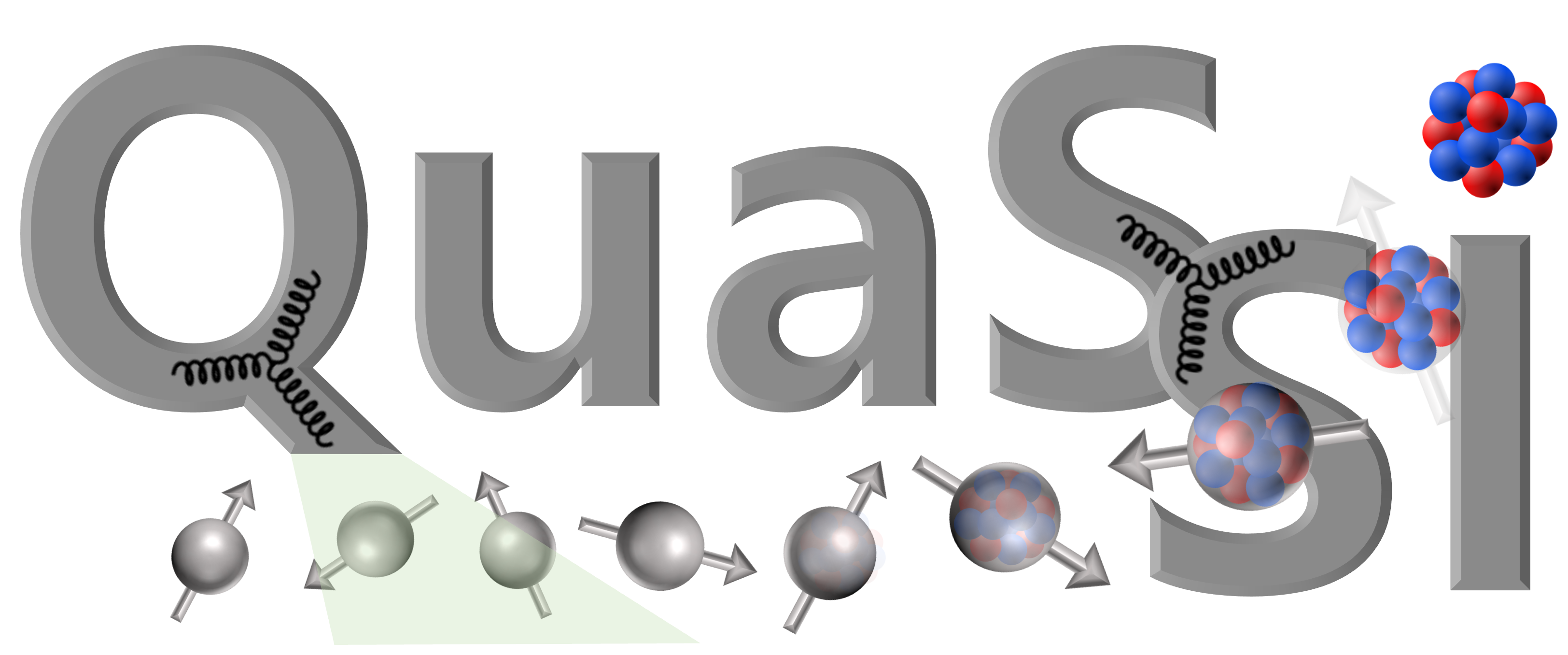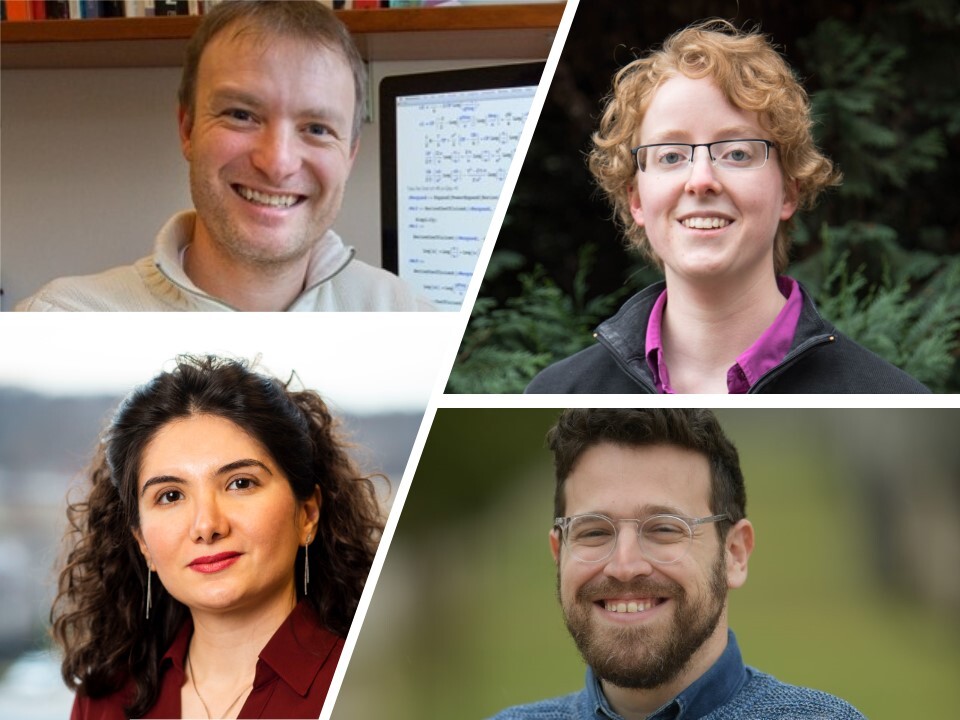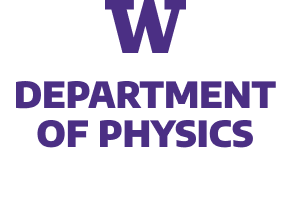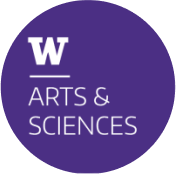
Quantum Simulation of Strong Interactions (QuaSI) Workshop 2 : Implementation Strategies for Gauge Theories
Organizers: Christian Bauer (LBNL), Zohreh Davoudi (UMD), Natalie Klco (Caltech) and Erez Zohar (Jerusalem).
The discretized formulation of quantum field theories has provided a rigorous framework for ab initio numerical studies of gauge theories with controlled systematic uncertainties, supporting experimental efforts in nuclear and high-energy physics. However, growing multiplicities of the final states in highly energetic processes, accounting for exponential growth of dynamical configuration spaces, as well as real-time evolution of such configurations necessary in computing time-dependent observables, present fundamental limitations to our current methods. Consequently, a range of phenomena relevant to equilibrium and out-of-equilibrium phases of strongly interacting systems is computationally inaccessible. To extend beyond capabilities of the current lattice gauge theory program, radically different non-perturbative approaches may be required. One approach, proposed in the 1980’s by Feynman and others, is the introduction of quantum degrees of freedom directly into the computational framework—an approach that is showing potential with first examples of simulations having recently become experimentally feasible.
Fortuitously, a wide variety of promising directions for both the design of quantum architectures and theoretical strategies for the quantum simulation of gauge theories have been developed in recent decades. The first QuaSi workshop holistically and closely examined many complementary theoretical strategies as a community e.g., concretely discussing their mechanisms for representing and evolving gauge fields with quantum degrees of freedom, and hence developed an understanding of their strengths and weaknesses for near-term and long-term performance. This second QuaSi workshop will focus on the promising quantum architectures themselves—celebrating, in detail, recent experimental demonstrations of relevance to the quantum simulation of gauge theories. It will connect with the QuaSi-1 community to encourage progress toward codesign of the quantum hardware that will likely accelerate future simulation capabilities.
Throughout the week, individuals and collaborators will host “QuaSI talks”—interactive presentations or discussion sessions. QuaSI workshops serve to strengthen connections among an engaged network of physicists invested in the quantum simulation of strong interactions and will continue to lay the groundwork for future collaborations on topics ranging from theoretical developments to practical or conceivable quantum-hardware implementations.
What is a QuaSI Workshop?
“A QuaSI workshop is an avenue for cultivating new ideas and strategies to be built upon existing understandings and developments in a field that moves and expands rapidly. A QuaSI workshop is not a place for showcasing general ideas and flashing results, but is an environment for learning collectively and for investigating existing ideas in depth and at length. A QuaSI workshop is a ‘school’ for researchers at the forefront of developments and, at the same time, is a ‘workshop’ that examines and generates new ideas/methods through a focused effort. Interactions are at the core of a QuaSI workshop and our participants love talks and Q&A sessions using a (black)whiteboard (virtual or physical)!”
“A QuaSI workshop is a way to connect people from various backgrounds working broadly on simulation of the strong interaction on quantum computers. The goal of the workshop is not to advertise the latest work of individual groups, but rather to teach others in the field about the various approaches taken. Talks in the workshop should be more like mini-lectures than traditional conference presentations, with the idea that attendees can follow all steps of the lecture and learn important concepts that underly a given formalism. Active participation and questions are strongly encouraged during the talks.”
“The Quasi Workshop is a community-oriented workshop, in which we all join forces together. We teach and learn from each other, and become familiar with one another, with our works, our perspectives, and our future goals. This workshop is not about advertising our works or competing with each other, but rather on strengthening the connections in our field, both between people and research topics, building a synergetic community, eager to study, research and advance together.”
“A QuaSI workshop aims to create an inviting and focused environment for researchers within a field to develop together a foundation of concrete understanding and perspective through which future discoveries can be quickly contextualized and integrated. Guided by scientific understanding, a QuaSI workshop is designed to provide interactive and collaborative opportunities for deeply appreciating the ideas presented in our diverse and extensive literature and for nurturing community coherence going forward.”
Hourly Schedule
Tuesday, June 1
- 7.50am - 7.55am
- IQuS Welcome
- Silas Beane, David Kaplan and Martin Savage
- 7.55am - 8.00am
- Quasi Organizer's Welcome
- Christian Bauer, Zohreh Davoudi, Erez Zohar and Natalie Klco
- 8.00am - 8.40am (25+15)
- Cold Atom Simulations of a Z2 Lattice Gauge Theory
- Monika Aidelsburger (Max Planck Institute)
- 8.40am - 9.20am (25+15)
- Simulating Lattice Gauge Theories with Rydberg atoms
- Federica Surace (SISSA and ICTP)
- 9.20am - 10.00am (25+15)
- Scalable Simulations of U(1) Gauge theory in One- and Two-Dimensions with Cold Atom Quantum Simulators
- Fred Jendrzejewski (Kirchhoff Institute for Physics at Heidelberg University)
- 10.00am - 10.05am
- Break
- 10.05am - 11.00am
- Discussion - Analog Quantum Simulation of Gauge Theories
- Jad Halimeh (Discussion Lead)
Wednesday, June 2
- 8.00am - 8.40am (25+15)
- Quantum Simulation of Non-Abelian Lattice Gauge Theories
- Randy Lewis (York University)
- 8.40am - 9.20am (25+15)
- Variational Approaches to Quantum Simulation of Abelian and Non-Abelian LGTs
- Jinglei Zhang (University of Waterloo)
- 9.20am - 10.00am (25+15)
- Digital Dynamics: Benchmarks and Error Mitigation Techniques
- Erik Gustafson and Yannick Meurice
- 10.00am - 10.05am
- Break
- 10.05am - 11.00am
- Discussion - Digital Quantum Simulation of Gauge Theories
Thursday, June 3
- 8.00am - 8.40am (25+15)
- Extending the Trapped-Ion Simulator Toolkit for LGT Simulations
- Zohreh Davoudi (University of Maryland)
- 8.40am - 9.20am (25+15)
- Superconducting Quantum Circuits as Analog simulators for Quantum Fields
- Ananda Roy (Technische Universit¨at Munchen)
- 9.20am - 10.00am (25+15)
- Quantum Continuous Variable for Quantum Field Theories
- George Siopsis (University of Tennessee)
- 10.00am - 10.05am
- Break
- 10.05am - 11.00am
- Discussion
Friday, June 4
- 8.00am - 8.40am (25+15)
- Quantum Link Models from Effective Hamiltonians of Dipolar Molecules
- Jiayu Shen, Di Luo and Michael Highman
- 8.40am - 9.20am (25+15)
- Emerging Two-Dimensional Gauge Theories in Rydberg Configurable Arrays
- Alessio Celi (Universitat Autònoma de Barcelona)
- 9.20am - 10.00am (25+15)
- Chiral Symmetry Restoration and Topology in Cold-Atom Quantum Simulations
- Daniel Gonzalez Cuadra (ICFO Institute of Photonic Sciences)
- 10.00am - 10.05am
- Break
- 10.05am - 11.00am
- Discussion
Monday, June 7
- 8.00am - 8.40am (25+15)
- Extracting the Field Theory Description of a Quantum Many-Body System from Experimental Data
- Torsten Zache (University of Innsbruck & IQOQI Austrian Academy of Sciences)
- 8.40am - 9.20am (25+15)
- Quantum Sensors for the Generating Functional of Interacting Quantum Field Theories
- Alejandro Bermudez (Universidad Complutense de Madrid)
- 9.20am - 10.00am (25+15)
- Inspiring Lessons: How Codesign Enabled Lattice QCD
- Norman Christ (Columbia University)
- 10.00am - 10.05am
- Break
- 10.05am - 11.00am
- Discussion




